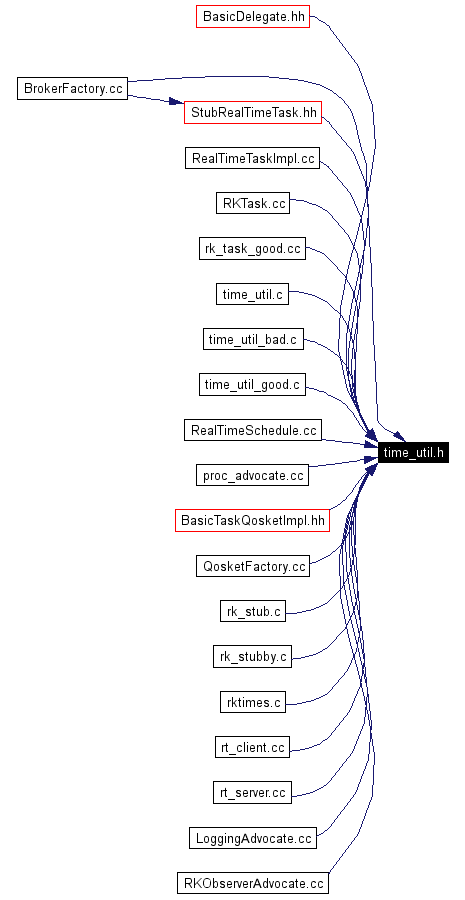
Definition in file time_util.h.
Include dependency graph for time_util.h:

This graph shows which files directly or indirectly include this file:

Go to the source code of this file.
Defines | |
| #define | MICROS_PER_SECOND 1000000 |
| The number of microseconds per second. | |
| #define | NANOS_PER_MICRO 1000 |
| The number of nanoseconds per microsecond. | |
| #define | tscmp(tvp, uvp, cmp) |
| Compare two timespec's. | |
Functions | |
| timespec | microsec_to_timespec (unsigned long long microseconds) |
| Convert a microsecond value to a struct timespec. | |
| unsigned long long | timespec_to_microsec (struct timespec *time_spec) |
| Convert a timespec to a microsecond value. | |
| int | string_to_microsec (unsigned long long *us_out, const char *str) |
| Convert a string to a microsecond value. | |
|
|
Value: (((tvp)->tv_sec == (uvp)->tv_sec) ? \
((tvp)->tv_nsec cmp (uvp)->tv_nsec) : \
((tvp)->tv_sec cmp (uvp)->tv_sec))
Definition at line 95 of file time_util.h. Referenced by rk_cpu_reserve_attr_valid(), rk_cpu_reserve_ctl(), and rk_next_tick(). |
|
|
Convert a microsecond value to a struct timespec.
Definition at line 44 of file time_util.h. References MICROS_PER_SECOND, microsec_to_timespec(), and NANOS_PER_MICRO. Referenced by RKTask::BeginCPUScheduling(), RKObserverAdvocate::BeginCPUScheduling(), microsec_to_timespec(), WeightedPolicyImpl::RedistributeCPU(), StrictPolicyImpl::RedistributeCPU(), rk_cpu_reserve_create(), rk_cpu_reserve_tick(), RKObserverAdvocate::RKObserverAdvocate(), RKTask::RKTask(), and RKTask::SetComputeTime(). |
Here is the call graph for this function:

|
||||||||||||
|
Convert a string to a microsecond value. The string format is a number followed by an optional unit notation, where microseconds is the default unit. For example:
Definition at line 29 of file time_util.c. References ensure, and require. Referenced by RKObserverAdvocate::BeginCPUScheduling(), RKTask::BeginCPUScheduling(), bfRealTimeTaskHey(), paProcessOptions(), rktProcessOptions(), and RealTimeSchedule::setParameters(). |
|
|
Convert a timespec to a microsecond value. NOTE: There is a loss of precision in the conversion.
Definition at line 61 of file time_util.h. References MICROS_PER_SECOND, NANOS_PER_MICRO, and require. Referenced by c1_pre(), RKTask::Deadline(), RKTask::GetComputeTime(), RKTask::Period(), BasicDelegate::postcall(), RKTask::ReportCPU(), rk_cpu_reserve_create(), rk_cpu_reserve_tick(), rk_stub_next_tick(), and RKObserverAdvocate::run(). |
 1.3.6
1.3.6